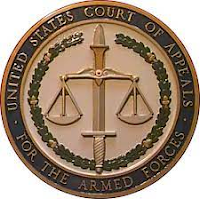Readers concerned about the Pakistani litigation on the threatened use of military courts to try civilians will recall this recent post reproducing excerpts from two articles by an Islamabad-based writer and the Editor's email to him in response. In the interest of completeness, the full correspondence follows so that readers may draw their own conclusions (read from the bottom up):
Dear Mr. Eugene:
I acknowledge receiving your message. I have raised questions regarding certain 'facts,' which, unfortunately, you have chosen to overlook.
Farrukh
____
Dear Dr. Saleem,
In answer to your questions:
1. The United States Supreme Court has found it unconstitutional to prosecute civilians by court-martial. See, e.g., United States ex rel. Toth v. Quarles, https://supreme.justia.com/cases/federal/us/350/11/; Reid v. Covert, https://supreme.justia.com/cases/federal/us/354/1/.
The Court has not yet ruled on the constitutionality of the rarely-employed provision of the Uniform Code of Military Justice that permits the court-martial of civilians who are serving with or accompanying an armed force in the field in time of a declared war o[r] contingency operation. To be sure, civilians may be subject to military trial by occupation courts, but that is irrelevant to the issue currently before the Supreme Court of Pakistan.
2. I find no reference to military courts in the Indian statute you cite. If I missed it, please point me to the pertinent section(s).
3. Yes, and it is totally improper. Egypt is a party to the African Charter, which is interpreted to forbid such trials.
4. No, but you should review ¶¶ 34-38 (Principle No. 6) of the 2018 "Yale Draft," https://www.court-martial-ucmj.com/files/2018/06/The-Yale-Draft.pdf.
I'm not sure I follow your point about being "practical" rather than delving into "theoretical or academic aspects." We are, after all, dealing with the Rule of Law, and I remain curious about the sources on which you relied when listing countries in your recent columns.
Sincerely,
Gene Fidell
_____
Dear Mr. Fidell,
I trust this email finds you in good health. I appreciate your email, which I have read not once but a few times over.
Rather than delving into the theoretical or academic aspects, please allow me to approach the subject from a practical standpoint. I have a few questions that I believe will help clarify the context:
1. Has the US ever conducted trials of civilians in military tribunals?
2. Were civilians accused in the 1993 Bombay Bombings tried under TADA in India?
3. In Egypt, have civilians been subjected to trials under the 'Law on the Protection of the Armed Forces'?
4. Is there a specific prohibition on civilian trials in military courts under the International Covenant on Civil and Political Rights?
Your insights have significantly increased my understanding of the matter, and I am grateful for the knowledge you have shared.
Thank you once again for your time and expertise.
Best regards,
Farrukh
_____
Dear Dr Saleem,
I teach Military Justice at Yale Law School and edit the Global Military Justice Reform blog. In that connection, I read with interest two recent articles in which you list a number of countries, including the US, as trying civilians in military courts. I believe that list is misleading in several respects and gives a mistaken impression of the state of human rights law and practice. As I am sure you will agree, for example, a number of the States whose practice you cite -- e.g., Myanmar -- cannot by any stretch of the imagination be called democratic or governed by the Rule of Law.
You wrote that US "summary courts" can try civilians for rioting, and cite the federal riot statute. But that statute does not refer to summary courts or military courts. As for our military commissions, these can try only enemy combatants, and our Supreme Court held in Ex parte Milligan in 1866 that civilians could not be tried by military commission if the civilian courts are open. Our courts-martial can try civilians only in time of a declared war or a "contingency operation" if the accused serves with or accompanies an armed force in the field. The US Supreme Court has not ruled on whether even that highly restricted provision is constitutional.
In Martin v. United Kingdom, the European Court of Human Rights materially limited the circumstances in which a State can try a civilian in a military court under the European Convention.
Turkey used to try civilians by military courts, but that was disapproved by the European Court in Ocalan v. Turkey. I have read the 2016 Decree-Law to which you have referred; I did not find in it any provision for the military criminal trial of civilians, and no such provision is mentioned in the Venice Commission's report on it, which can be found at https://www.venice.coe.int/webforms/documents/default.aspx?pdffile=CDL-ad(2016)037-e. A 2008 article indicates that Turkish military courts no longer have jurisdiction over civilians. https://dergipark.org.tr/tr/download/article-file/627016. You refer to further legislation after the 2016 Decree-Law. Can you point me to something specific on this question?
In Uganda, the Constitutional Court has held that the statutory provision conferring court-martial jurisdiction over civilians is unconstitutional. An appeal has been pending before the Supreme Court for a long time.
For its many signatories, the African Charter has been interpreted to forbid any exercise of military jurisdiction over civilians.
The Inter-American Court of Human Rights, which applies to, among other States, Colombia, Mexico, Venezuela and Brazil (each of which you cite), has repeatedly disapproved the use of military courts to try anyone other than serving personnel.
Ukraine does not currently have military courts.
I do not believe India's Armed Forces (Special Powers) Act confers criminal jurisdiction over civilians on that country's military courts.
If I am missing something on this important question, I'll welcome further information.
Sincerely,
Eugene R. Fidell





.webp)

.jpg)

















.jpg)





